PRESERVING A MILITARY LEGACY FOR FUTURE GENERATIONS
The following Reflections represents SP4 Roy Sheldon’s legacy of his military service from 1968 to 1974. If you are a Veteran, consider preserving a record of your own military service, including your memories and photographs, on Togetherweserved.com (TWS), the leading archive of living military history. The following Service Reflections is an easy-to-complete self-interview, located on your TWS Military Service Page, which enables you to remember key people and events from your military service and the impact they made on your life. Start recording your own Military Memories HERE.
Please describe who or what influenced your decision to join the Army.
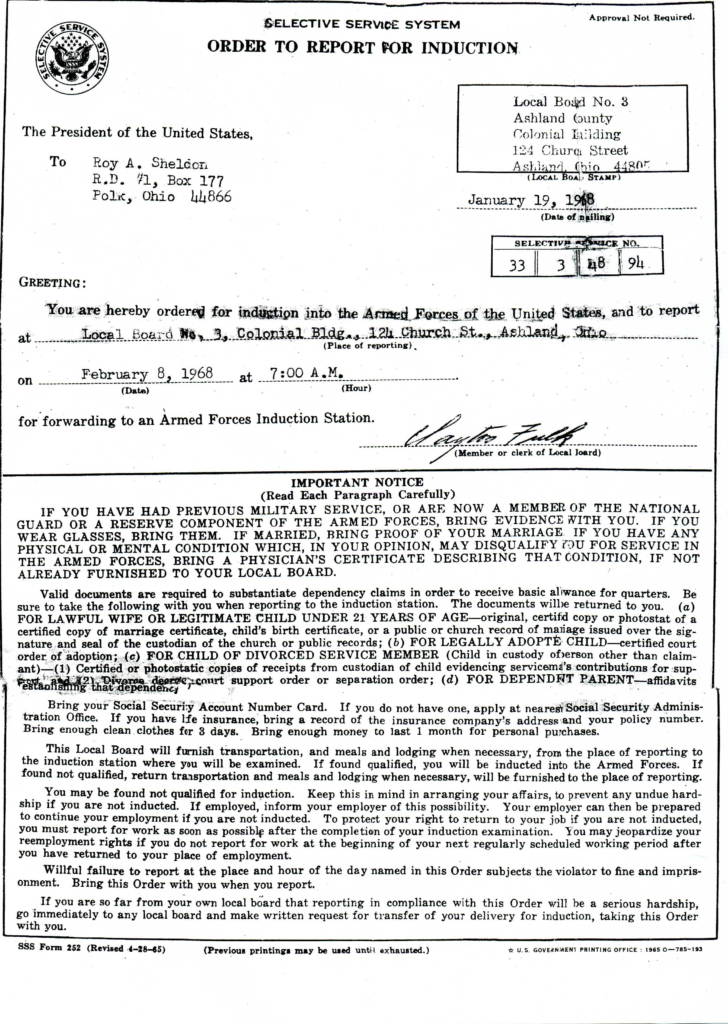
A letter containing an order from the President ordering me to report for induction into military service “influenced” me to show up at my draft board office in Ashland, Ohio, on 8 Feb 1968 for the bus trip to Cleveland with several other young men to be inducted. The government was drafting 50,000 men monthly at the time I was drafted.
Not very many members of my family had served in the military over the years. My first cousin, Ron, who was five years older than me, had been drafted in Jan. 1965, completed his BCT at Fort Knox, his AIT as a communications specialist at Fort Gordon, GA, was shipped off to Vietnam for a 13-month tour, returned, and was discharged in early 1967.
Also, I had two uncles who served stateside in the Army during World War II, two great-great-grandfathers who enlisted in Ohio Volunteer Infantry units during the Civil War, and one of whom was wounded during the Vicksburg campaign in 1863. My 4th great grandfather was a sergeant in the New Jersey militia during the Revolutionary War. Thomas Sheldon (1789-1871), my 3rd great-grandfather, served in the Ohio militia during the War of 1812.
I knew that my country wasn’t perfect, but I was loyal to the principles of the Declaration of Independence and the Constitution and knew a few of my forebears had decided to serve her in a time of need. Consequently, I believed it was my duty to answer the call to service.
Whether you were in the service for several years or as a career, please describe the direction or path you took. What was your reason for leaving?

Early on in the Army, I decided to limit my time in the military to fulfill my 2 years of active and 4-year reserve duty my country mandated. I came to think that an academic environment would better fit my desire to learn and to better myself. After completing my two years of active duty in 1970, I began to further my education beyond earning a high school diploma in 1966 by taking the ACT, applying for college admission, and enrolling to take courses.
I earned a BA in English and American Studies at Kent State University, summa cum laude, in 1974 (while completing my reserve duty), an MA in English at Bowling Green State University in 1976, and a Doctor of Philosophy degree in English from Purdue University in Dec 1982. I accepted a position at Washburn University in 1983 and taught in the Department of English there for 32 years, retiring in 2015 as Associate Professor Emeritus.
If you participated in any military operations, including combat, humanitarian and peacekeeping operations, please describe those which made a lasting impact on you and, if life-changing, in what way?

I was part of the Sep 1969 Operational Readiness Test and Mass Casualty Exercise at the 97th General Hospital, Frankfurt in Main, Germany. This exercise tested our ability to efficiently and effectively handle a mass casualty event in Europe during the Cold War. Our company commander issued a commendation to all of the participants in the successful test and exercise.
We also went on alert status as a result of the Warsaw Pact Soviet Army’s violent invasion of neighboring Czechoslovakia in Aug.1968. We assembled on our wards with our gear, including gas masks, wondering for several hours whether the Cold War would soon become Hot.
Did you encounter any situation during your military service when you believed there was a possibility you might not survive? If so, please describe what happened and what was the outcome.
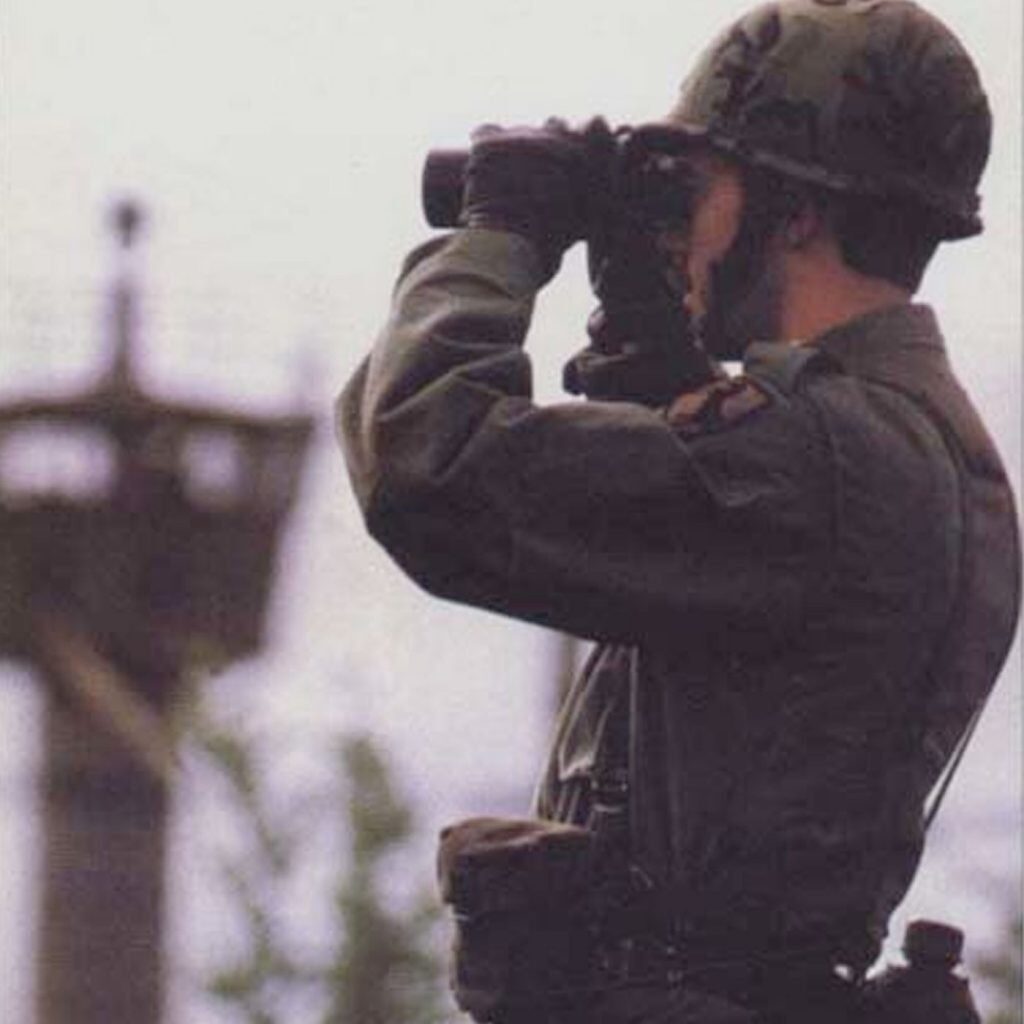
In August 1968 the Warsaw Pact and Russian military invaded nearby Czechoslovakia, and the 97th went on alert status. We went to our wards in our gear, including gas masks, wondering for a number of hours whether the Cold War was going to become Hot. In the era of Mutually Assured Destruction (MAD), the possibility of nuclear war was ever-present in our minds. Our hospital in Frankfurt was located about 70 miles from the East German border, across which were a number of Soviet Army and Tank divisions. The Fulda Gap gave the Soviets a direct path to Frankfurt. However, they would have to go through the 7th Army to get there.
Of all your duty stations or assignments, which one do you have fondest memories of and why? Which was your least favorite?
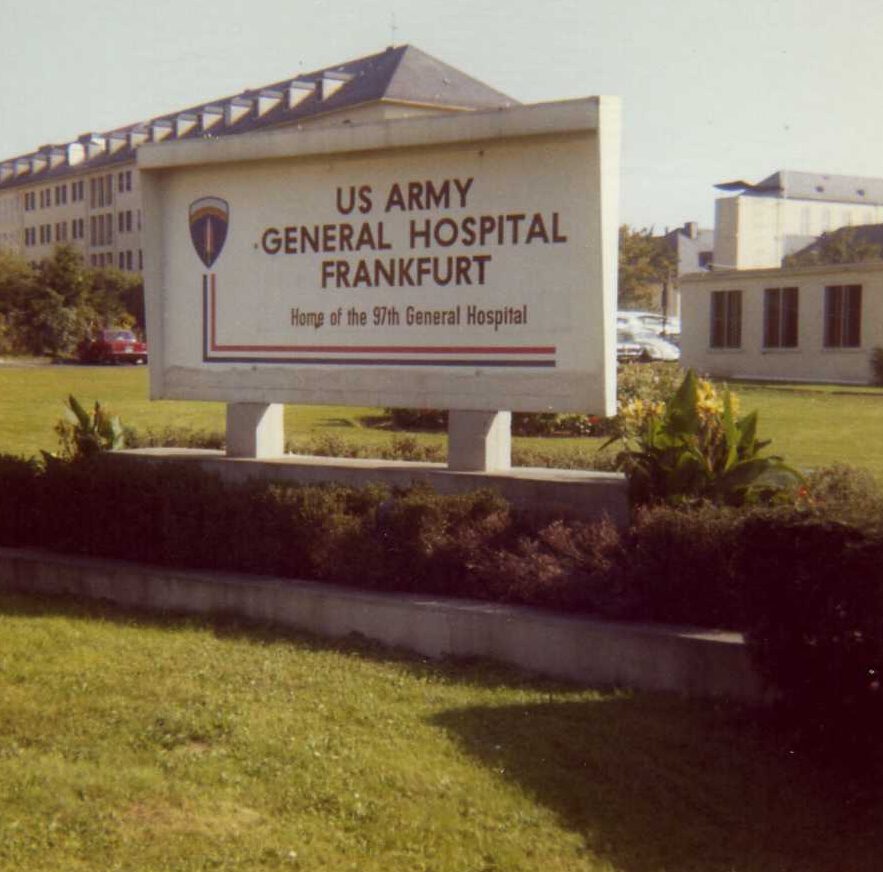
Serving at the 97th General Hospital was most rewarding because it was a well-run unit amidst the cultural experience of being in Germany–“Machts nichts, schnitzel bags, and clicks.” I had opportunities to travel in the country and in Europe (Switzerland, France, and Spain) to see the diversity of cultures and environments. I also enjoyed medical training at Fort Sam Houston, TX, also known as “the country club of the Army.” It was during the Hemisfair Exhibition in San Antonio, which was enjoyable and culturally educational. River Walk (Paseo del Rio) was the best.
The most challenging location was my basic combat training experience at Fort Knox, KY, also known to some as “the armpit of the Army.” It occurred during winter months in a cold, noisy tank exhaust-filled environment, with the added drama surrounding the King assassination in early April 1968–training units called to alert and the buzz of multiple airplanes taking troops to rioting cities in the middle of the night. Somewhat unsettling, but it was a skill and character-building experience.
From your entire military service, describe any memories you still reflect back on to this day.
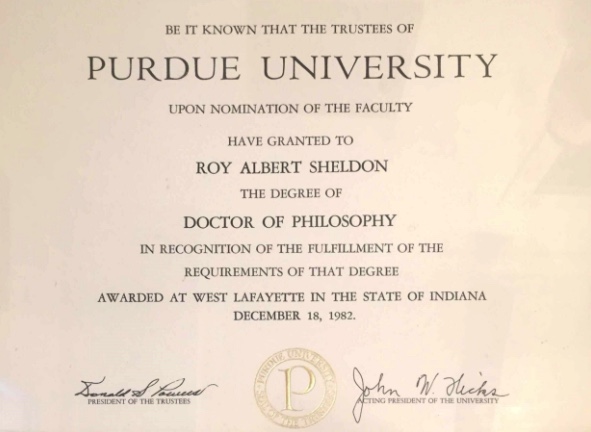
The experience of helping soldiers and their family members recover from injury or illness and regain health has been most rewarding to me. I felt fortunate to be a medic and have some thoughts about why that happened.
During my first week or so at Fort Knox, I and a group of other US designated trainees were ushered into one of the classrooms for a special session. We were given this option: Because of our initial testing results, we had the opportunity to attend Officer Candidate School–but we would have to sign up for 3 years of active duty instead of the two we faced already. Obviously, I chose to serve my 2 years of active duty as an EM rather than 3 as an officer.
Also, when it came time to assign MOSs to us, I later found out that the infantry and radio communications MOSs were the first options indicated by Personnel, but that these were crossed out, and the medic MOS was written in. I considered myself fortunate and honored to be designated for medic training. Providence also followed me to the end of my medic training. It was rumored that 3 of the 4 graduating classes were shipped off to Vietnam duty stations. When our class’s orders were cut, I discovered that most of us were assigned duty stations in Europe, specifically West Germany. My and several others’ assignment was to the 97th General Hospital, APO NY 09757, in Frankfurt am Main rather than to a field unit.
Long after my ETS, I had the time to review my DA-1811, “Physical and Mental Status Upon Release from Active Service,” which pronounced me eligible to re-enlist. I saw that the record contained the results of the test battery I had taken early on at Fort Knox. I set out to decode the initials for the tests to figure out what they stood for. When I decoded the GT Test, I discovered that at that time, the GT was essentially an IQ test. (Later, in the 1980s, it was revised to be essentially a vocational interest test.) When I compared my score to standard IQ test score scales, I discovered that I could use my score as evidence to join American Mensa, Ltd., the High IQ Society, which requires potential members to score in the top two percentile of IQ test takers. I then was sure that my GT score might have been a factor in the Army’s offer to attend OCS and my designation for medic training years ago.
Later on, when looking through my few remaining high school documents, I discovered my high school guidance counselor Floyd Barcus’s results memo for a college aptitude test (another IQ test) I had taken in my junior year–and ignored since I was facing the draft and not college at that time. He indicated that my score of 98 meant that I had scored higher than 98 out of every 100 juniors who had taken the test.
I realize now that those two tests indicated that my desire to seek a college education after my service and carry it all the way to earning a doctoral degree and pursuing a professorial career was the appropriate life choice.
What professional achievements are you most proud of from your military career?
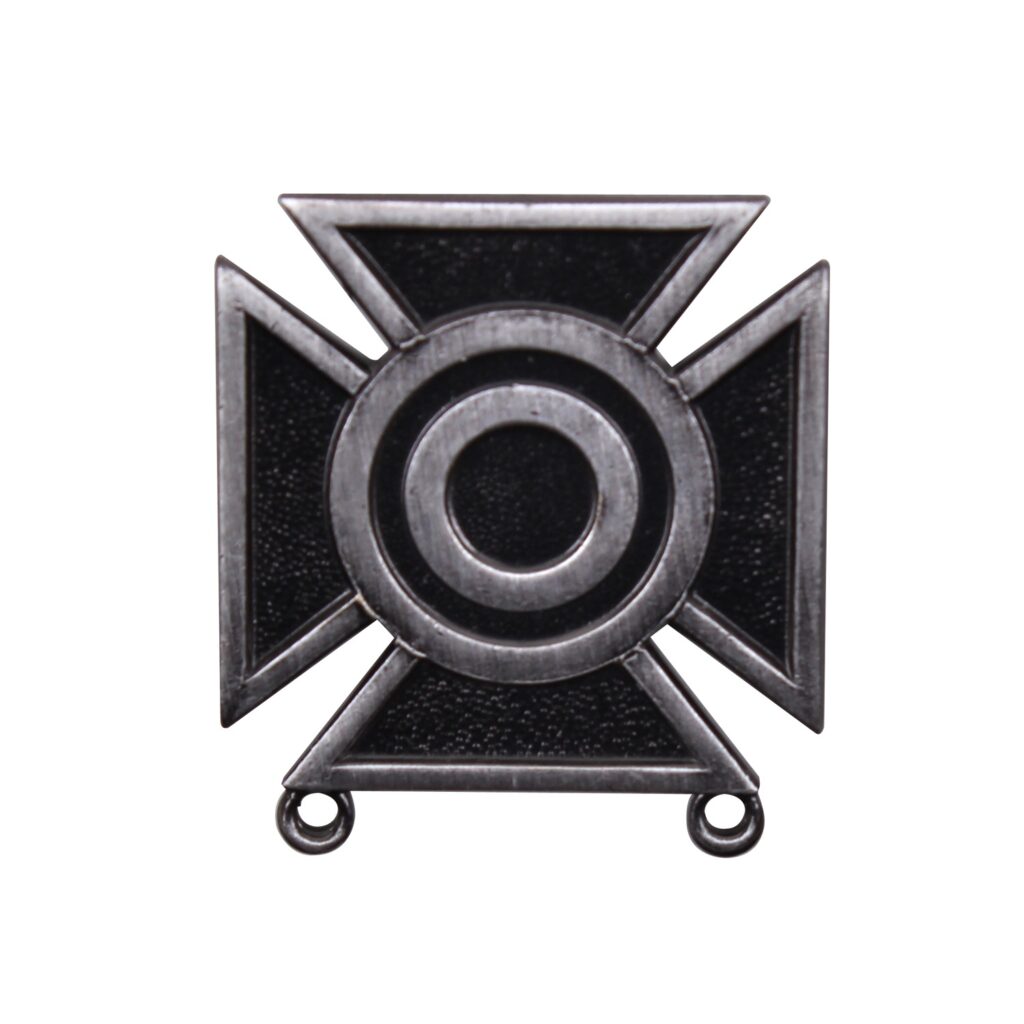
I am most proud of being able to help soldiers regain their health and return to duty effectively. The Letter of Appreciation I received from my NCOIC and endorsed by my Company Commander and the Chief of Nursing validated my performance and conduct as a medic in the three wards in which I had worked: Intensive Care, Pediatrics, and Male Medical.
Also, I am proud of earning a Sharpshooter badge in qualifying with the M-14 during BCT. I had gained much practice shooting at home, taking out invasive and mischievous groundhogs that had taken up residence near our house and vegetable gardens on our nine-acre homestead in north-central Ohio. However, that was with a 12-gauge Iver-Johnson shotgun. This badge was with a weapon I was trained to help defend and protect our nation as a Soldier.
Of all the medals, awards, formal presentations and qualification badges you received, or other memorabilia, which one is the most meaningful to you and why?

Earning the National Defense Service Medal was a recognition of the part I was playing in the defense of democratic nations during the Vietnam Era of the Cold War.
I am proud that I have served my country honorably during a time of war, as my Honorable Discharge denotes. In my Clearance record for the 97th, my “Job Performance” and “Conduct” were rated “Excellent.” The Letter of Appreciation was written by my Ward NCOIC, SFC Lionel Martin, and endorsed by my Company Commander and Chief of Nursing Service I appreciate it because it indicates that they valued my contributions to my job performance.
A second Letter of Appreciation from SFC Curtis Palmer, who also supervised me during my time at the 97th, is meaningful because I also valued his professional work during the many shifts I worked on with him.
Which individual(s) from your time in the military stand out as having the most positive impact on you and why?

My drill instructors, first sergeants, and commanding officers were fine role models of good conduct and effective performance for me. They inspired me to work hard and do the right thing. At Fort Knox BCT, my DIs included SGT James Hepler, SGT Guy Beck, SGT John Downer, and others. I remember one drill sergeant’s advice about saluting etiquette, “Remember, no matter what you think of the person, you’re saluting the uniform and rank, not the man.”If any of us slipped up and called him “sir,” he barked at us, “Call me, ‘Drill Sergeant,’ not ‘Sir!’ I work for a living!” And then there was, “If you screw up, remember, your ass is grass, and I’m the lawnmower!” On policing the barracks area, “I want to see a-holes and elbows out there! Get down and pick every cig butt up!”
My First Sergeant at the 97th, James C Carr, was rigorous but fair. At the end of my time there, before my PCS, he awarded me a Good Conduct Medal. His award was unofficial since, at that time, a US designee could only receive the Army Good Conduct Medal if serving in or having served in a combat zone. I call mine the “1st Sgt. James C Carr Good Conduct Medal.”
List the names of old friends you served with, at which locations, and recount what you remember most about them. Indicate those you are already in touch with and those you would like to make contact with.
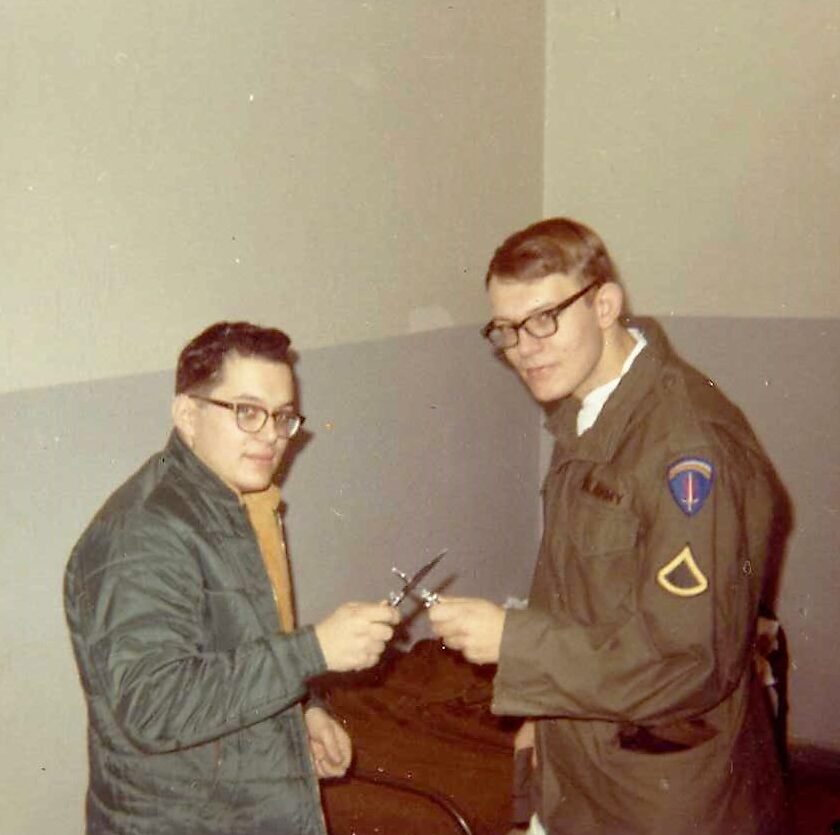
My best friends at the 97th were Manny Rodriquez, Jack Manick, and Eugene Druckenmiller. They were serious about doing their job well but had a good sense of humor. Jack and Gene, RA’s, volunteered for Vietnam after only about six or seven months at the 97th. Jack was a medic and served in Ban Me Thuot. He later served a stint at Fort Riley before his ETS. Gene had a tailor MOS, but since tailors weren’t in demand in Vietnam, he became an ammo carrier with the 576th ORD CO at Phu Loi and Long Binh, Vietnam. I occasionally get an email from Jack, who lives in NJ, but I haven’t heard from Gene.
Manny was a medic from Dallas, TX. We took our leaves together in Oct 1969. We went on a 10-day Scheffler Travel Service guided bus tour of Switzerland, France, and Spain, where I practiced my high school Spanish, honed by hours of listening to the VOA and the BBC “en Espanol” home on my family’s old GE tabletop radio. The Alps, Paris’s Louvre, the Eiffel Tower, Lourdes, Barcelona, Madrid, and Verdun were highlights of the trip. I PCS’d to CONUS before Manny, and I haven’t heard from him since late 1970.
Can you recount a particular incident from your service, which may or may not have been funny at the time, but still makes you laugh?
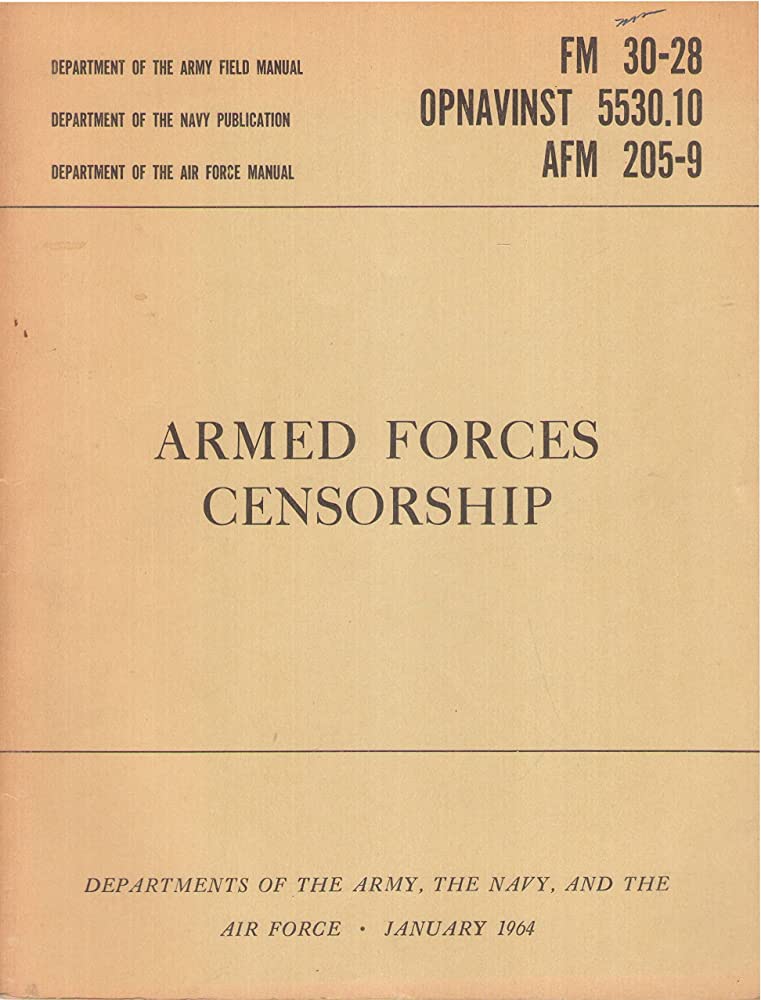
When I was doing my summer Annual Training stint with a national guard ambulance company, I faced a 1st Sergeant who seemed determined to keep those of us vets temporarily assigned to the unit busier during our IRR training time there, especially with KP, night shifts on ambulance duty, policing the area of litter and cigarette butts, etc. Yes, I expected to do these typical trainee activities. However, the incident below seemed more than typical, and I wasn’t laughing until the end of it.
One day, Top Kick brought me a tall, thick stack of Army SOP manuals in ring binders. Handing me a box of ring hole reinforcers, he assigned me to stick them neatly over frayed, weakened, or torn ring holes in the pages of the manuals. He left, probably thinking it would keep me busy the rest of the day trying to align the patches with the holes. I thumbed through the manuals and noted several pages needed one or more of the circular doughnut-holed patches per page. I took a patch from the box, and, looking at a pencil in a loaded pencil holder nearby, I grabbed it. Amazingly, the pencil was the same size as the hole in the reinforcer patch! I then put the pencil through the patch and inserted the pencil through the ring hole (which was the same size as the patch hole) of a page that needed reinforcing. Bingo! So much for hand-finger aligning!
Not having to worry about aligning patches, I worked at a good pace through the manuals and finished the repair work well ahead of the expected time. Top Kick was perplexed. Looking at the well-fitted patches in the manuals, he asked, “How’d you do this so quickly?” I showed him my pencil and explained the process to his dismay. Back at my bunk, relaxing with the rest of the day off, I chuckled to myself–wondering what my 1st Sergeant at the 97th would have said to the NCO here! And I’m still chuckling!
What profession did you follow after your military service and what are you doing now? if you are currently serving, what is your present occupational specialty?
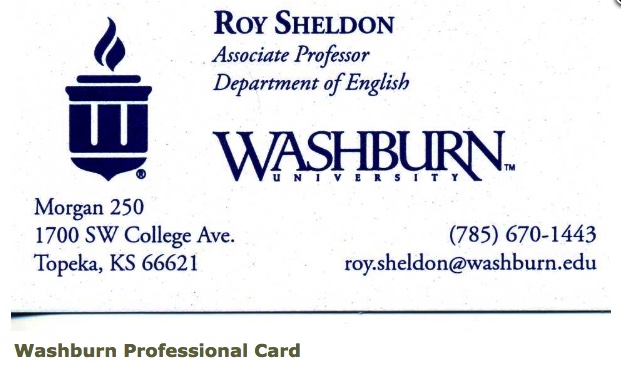
During my education after leaving active duty and earning a BA degree while I was in the Army Reserve, I taught as a Graduate Teaching Assistant and later as an Instructor from 1974 to Dec 1982, when I earned a Ph. D. from Purdue University after successfully passing the coursework, requisite exams, and completing a lengthy dissertation successfully. In 1983, I accepted a tenure-track faculty position at Washburn University and earned tenure in 1989. I taught business writing, literature, science fiction, and fantasy courses there for 32 years. I directed the Writing Center from 1983 to 2010 and retired in 2015 as Associate Professor of English Emeritus. Though I am enjoying my retirement, some health issues currently limit my opportunities for participation in several activities.
What military associations are you a member of, if any? what specific benefits do you derive from your memberships?
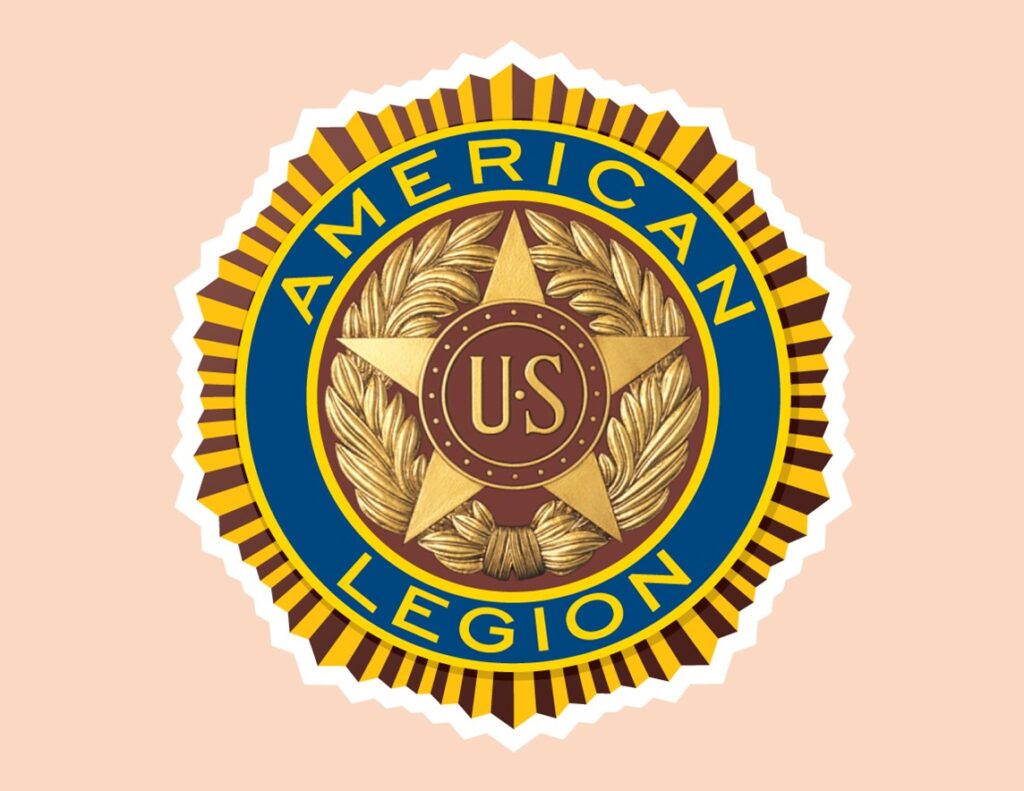
The American Legion has given me more of a sense of being close to those who have served in the military before, during, and after my time there. Other benefits include more opportunities to socialize with other veterans and take advantage of discount offers.
In what ways has serving in the military influenced the way you have approached your life and your career? What do you miss most about your time in the service?
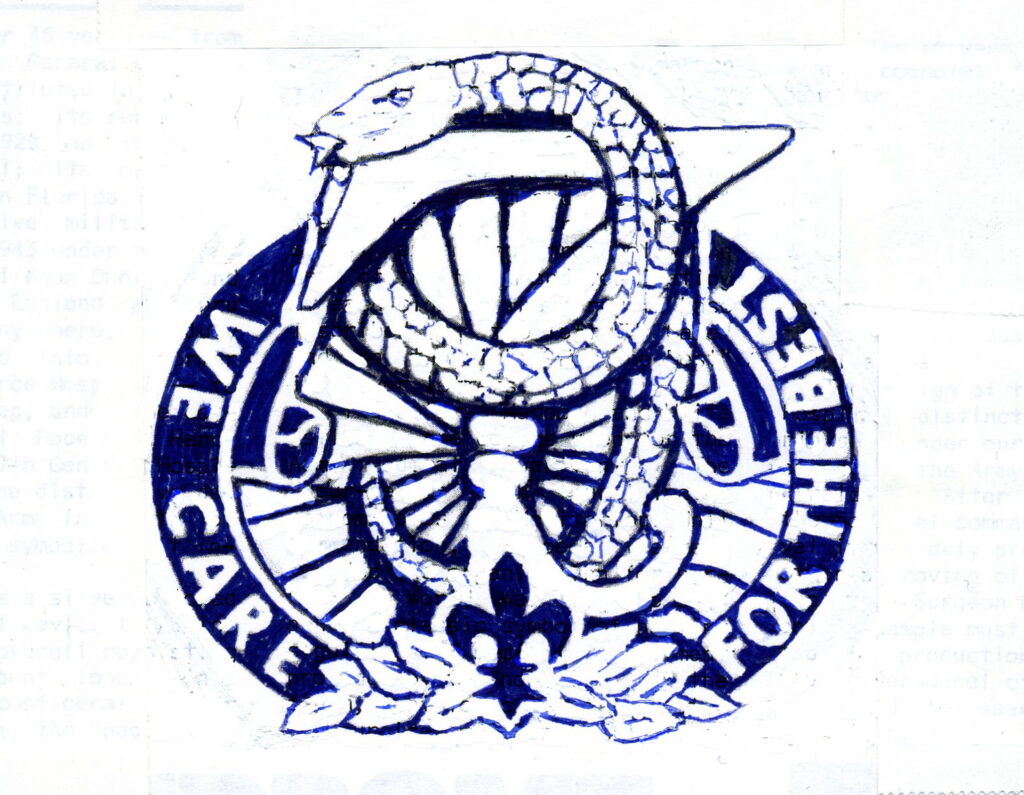
I have developed a more disciplined and problem-solving approach to issues in life due to my military experience. The military helped me to be able to grasp an opportunity to better myself by enriching my sense of discipline and purpose to achieve my educational and professional objectives. I went from letting Providence or Fate chart my course in life before and during my time in the Army to a more self-directed path because of what the military had given me. I came from a working-class family, and parents who, because they lived in a rural area and worked on family farms, never got beyond the 8th grade.
After my high school graduation in 1966 and before I was drafted in Feb 1968, I worked with my dad, helping him with his job about 12 miles from home as an interstate highway rest area custodian–and in the fall and winter, also helping him with his second job loading and delivering coal for the Fisher Coal Company in Ashland, 9 miles from where we lived, on the south edge of the village of Rowsburg, population 250. I could not afford to dodge the draft through an expensive doctor’s “diagnosis” of a bone spur–nor could I afford the cost of college, another source for a draft deferment. I worked with my dad and took what I was given.
I entered the Army because of the President’s order and my loyalty to my country. I was willing to go wherever the Army sent me during my two years of active duty. I discovered early on not to volunteer for anything, to follow orders, and to do my duty to the best of my ability. The Army sent me to BCT, Medic AIT, and the 97th General Hospital in West Germany rather than Infantry AIT and Vietnam.
My honorable service, my experiences as a medic, and the GI Bill gave me the chance to steer my fate to become what I felt was best suited for me. (My veterans benefits provided tuition support for my undergraduate degree only.) It took 12 years of study, term papers, qualifying exams, and a good-sized dissertation (with 8 years of the 12 teaching intro. composition courses) to earn a BA, an MA, and a Ph.D. (each degree at a different university) to help qualify me to be a university English professor. I was fortunate enough to be the one out of 30-plus candidates to be offered a tenure-track position at Washburn University. After a six-year probationary period to prove my worth or value to my tenured faculty colleagues, I earned tenure and promotion. I am thankful that my service and experience in the Army were the foundation for that professional opportunity and my personal development.
Based on your own experiences, what advice would you give to those who have recently joined the Army?
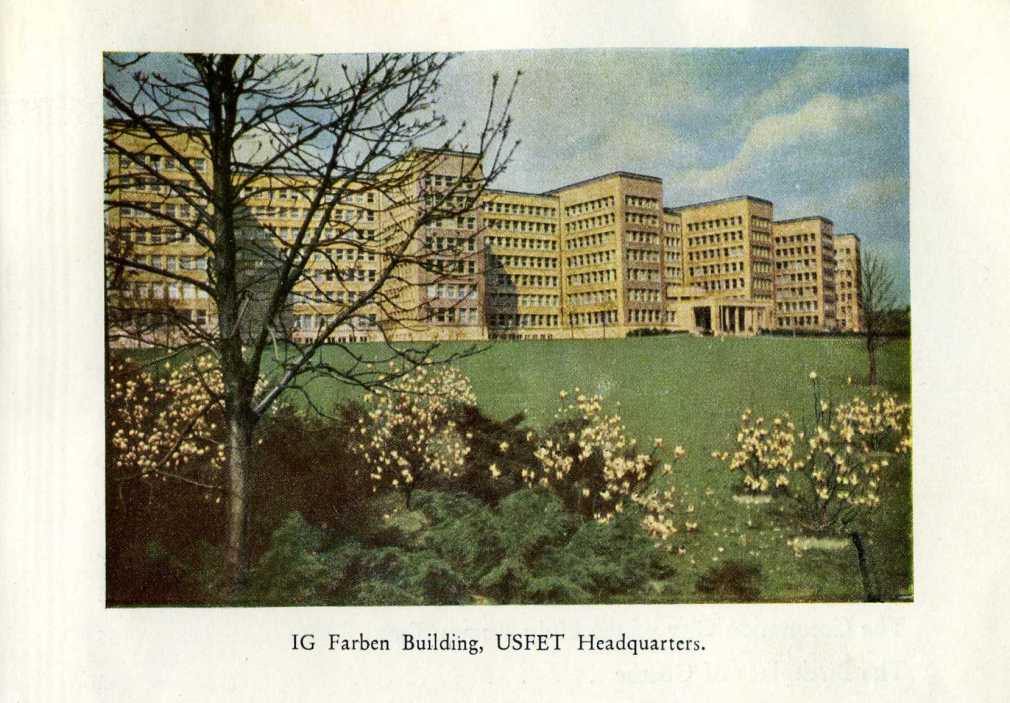
My advice is to put forth your maximum effort, learn the details but in the context of the big picture, put your head down, and move forward. Remember this about issues: Do your best and note, “And this too shall pass.”
Part of being in the military is not only being aware of what you need to do on base and in your job–but to be aware of the people and environment off base, where you may be circulating off duty–if personal security and your NCOs allow it.
Following the German news in English at Amerika Haus (USIA), talking with my barracks-mates, and watching Germans in the economy, I tried to understand the German people on the streets and in the bars of Frankfurt am Main.
I came up with several “types” of individuals related to the US military presence in their country. First, there were those who, whether they liked GIs or not, wanted us there because they desired our money and security from Soviet aggression. We spent Deutsche Marks in bars, restaurants, and stores, boosting their economy. Second were those who were less welcoming, the surviving former Nazis and Hitler’s military. These were mostly elderly gentlemen who wore small swastika tie clips and frowned and grunted disapproval, disdaining our presence. Third was the younger neo-Nazi skinheads. They traveled in groups, particularly at night, wanting to beat up GIs they found walking alone or maybe with a German girl.
A fourth was the leftist Baader-Meinhoff Gang or Red Army Faction (RAF) activists. These younger radicals also wanted Americans out. However, they went beyond street protests to riots, kidnappings, murders, and IEDs. In 1968 they detonated bombs inside two department stores in Frankfurt. Then in 1972, they detonated three bombs in Frankfurt’s I.G. Farben building complex (V Corps HQ), killing one Army officer and injuring dozens of American and German citizens. The RAF attacked the building complex twice more: once in 1976 and again in 1982. Due to its increasing importance, the building complex over time acquired the nickname “The Pentagon of Europe.”
While these aren’t the only types of Germans, these four types were a negative part of the undercurrent the American military faced in a beautiful post-WWII country with friendly and tolerant people. You, as a soldier, should be aware of the differing types of people abroad you are defending and living amongst. In my case, the military’s enrichment of my analytical mind and my German heritage helped me do that. (My 3rd great-grandfather and family on my mother’s side emigrated to the U.S. from Kirchheim a der Weinstrasse and Dirmstein, Rheinland-Pfalz, Germany, in the 1840s. From Derbyshire in England, my father’s side has been here since the mid to late 1600s.)
In what ways has togetherweserved.com helped you remember your military service and the friends you served with.
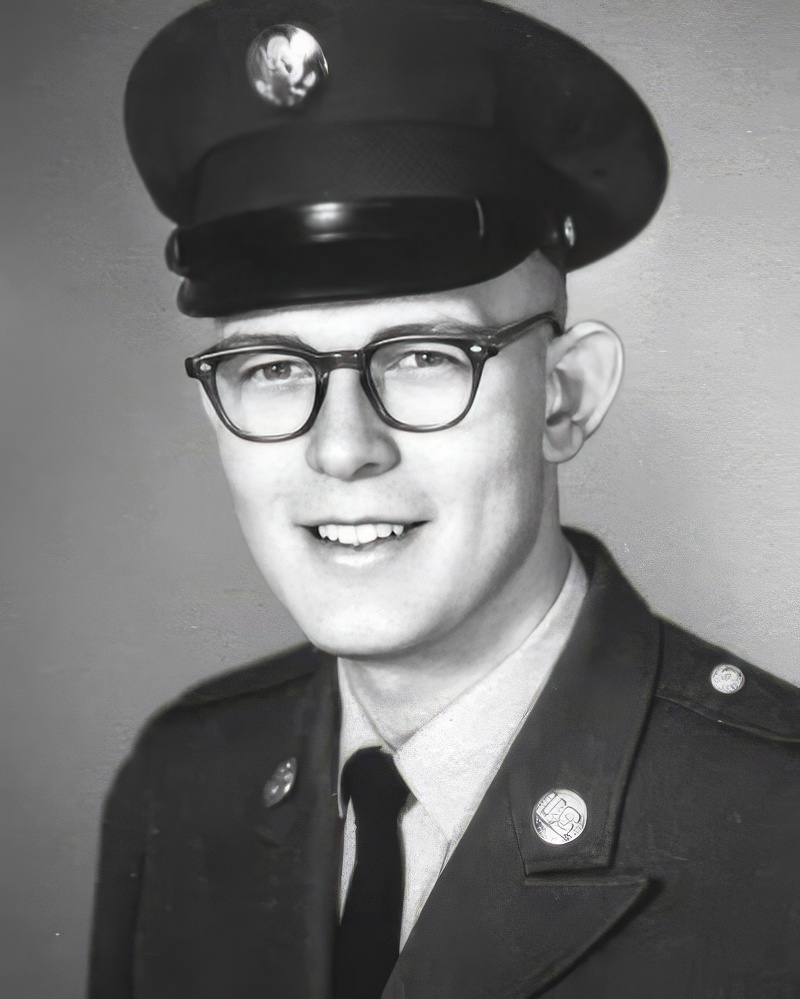
TWS has helped me remember more details about my military service, put it in a better perspective, and allowed me to find others with whom I have served.
I poured through the large scrapbook of my military memorabilia, which I call “Memories, Memos, and Momentos,” to refresh my memories and better identify names and places. It covers, with varying fullness, my induction, my BCT, my Medic AIT, my 97th duty station, and IRR Annual Training. It contains memos (orders, 97th SOP, notices, assignments, etc.), photos (from BCT, the 97th, European Leave, etc.), and memorabilia (certificates, patches, letters, holiday menus, dog tags, medic armband, airline, and Strassenbahn tickets, local currencies, etc.). I am trying to tie the names in there with those listed as serving at those locales.
PRESERVE YOUR OWN SERVICE MEMORIES!
Boot Camp, Units, Combat Operations
Join Togetherweserved.com to Create a Legacy of Your Service
U.S. Marine Corps, U.S. Navy, U.S. Air Force, U.S. Army, U.S. Coast Guard
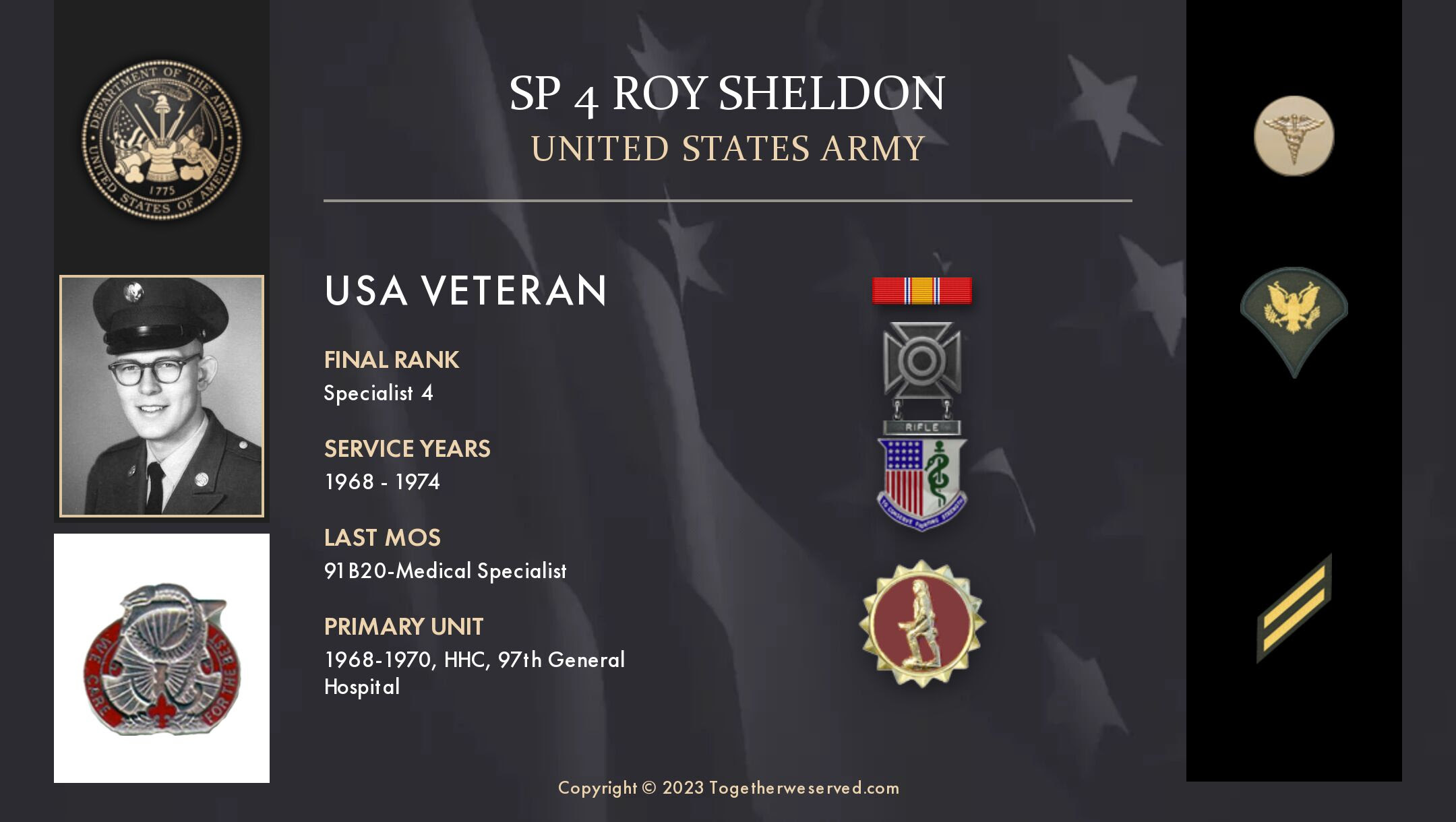
5 28 2023
Hi Roy,
Enjoyed reading your TWS reflections today. A portion of those are generally similar to my own. But several are uniquely similar, especially the army general aptitude test, advanced academic degree after military discharge, and writing (book author).
There’s another fellow who wrote a book “Just Ordinary Soldiers”, about his time in the US Army in the Fulda Gap, during the Cold War. He was in 3/36 I think, but in Mortars at about the same time I was there. I didn’t know him, but his writing looked very interesting; so I ordered the book. After service, he went on to get an advanced degree also, and became a lawyer, then adminisrative law judge.
Bob Amman
S-1 Legal Clerk, HHC, 3d Btn, 3rd Inf Division, Ayers Kaserne, Kirch Göens, W. Germany; June 1967-Dec 1968.